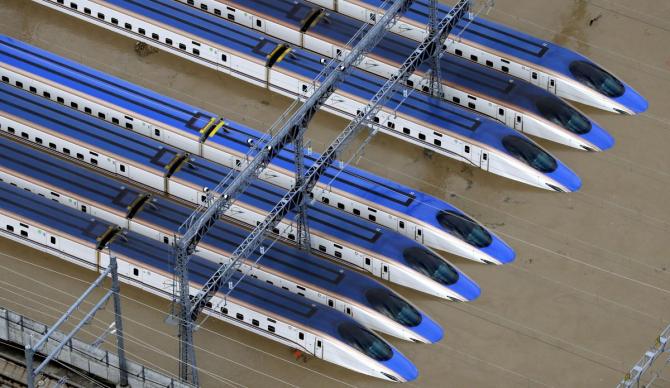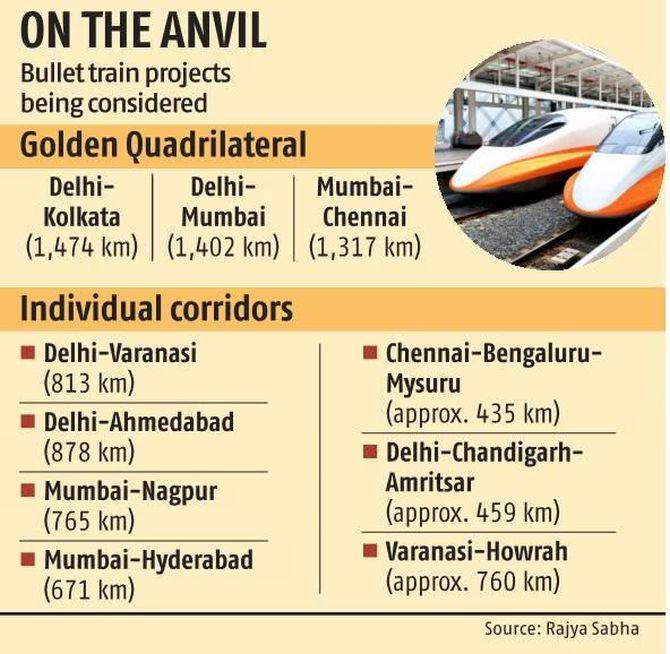A source in the know said two-three of the seven bullet train corridors could be included as a practical election promise.

The Bharatiya Janata Party is likely to include a promise of multiple high-speed rail (HSR) or bullet-train corridors in the coming five years as part of its election manifesto, sources aware of the matter told Business Standard.
"Building on what was committed five years ago, multiple projects for high-speed rail are being considered as a key promise for the next five years. The manifesto is likely to have these commitments," a senior BJP figure aware of the developments told this newspaper.
In the 2019 general election manifesto, too, the BJP had said it would expand high-speed trains in India.
'We will expand connectivity and experience of high-speed trains and new version trains such as Vande Bharat Express across the length and breadth of the country in the next five years,' the BJP's manifesto said five years ago.
Since then, the Centre has done feasibility studies for bullet trains on trunk routes and undertaken assessment work on multiple corridors.
Currently, the Centre is working on the 508 km-long Mumbai-Ahmedabad HSR project, which is expected to be flagged off in 2026 and will initially cover Surat-Bilimora in Gujarat, and the full stretch is expected to be completed in 2028 -- six years past its original deadline.
In 2022, the Centre had told Parliament that seven corridors were currently under consideration -- Delhi-Varanasi (813 km), Delhi-Ahmedabad (878 km), Mumbai-Nagpur (765 km), Mumbai-Hyderabad (671 km), Chennai-Bengaluru-Mysuru (435 km), Delhi-Chandigarh-Amritsar (459 km), and Varanasi-Howrah (760 km).
The seven projects were put on a fast track for early preparation works such as feasibility studies and detailed project reports, which are necessary to establish the economic viability of infrastructure projects through a metric known as internal rate of return (IRR).
At the original cost, the IRR for the Mumbai-Ahmedabad bullet train has been estimated at nearly 12 per cent.
However, this may have been impacted because the cost of the project has reportedly risen by at least Rs 60,000 crore (Rs 600 billion) owing to a six-year delay from its original deadline of 2022.
Another source in the know said realistically two-three of the seven corridors could be included as a practical election promise, considering that feasibility studies and detailed project reports (DPRs) had been submitted and seen by the ministry of railways.
Among the proposed projects, the Delhi-Varanasi corridor has been demanded by the government of Uttar Pradesh and the ministry of civil aviation for enhanced connectivity to the state's cities and upcoming airports such as Jewar, near Delhi, Business Standard had reported in October 2023.

In August 2023, it had been widely reported that the Railway Board was not keen on the project as the curvature of the route proposed did not allow for smooth operations of bullet trains, which require straight tracks to operate at speeds up to 320 km per hour.
The reports were denied by the Railway Board at the time, saying that the project was under consideration and the ministry had no issue with the DPR.
The other projects, so far, remain in limbo. Officially, the Centre said in February no decision had been taken on the seven corridors.
'The decision to sanction any HSR Corridor/Project depends on many factors such as outcome of DPR, techno-economic feasibility, availability of resources and financing options,' Railways Minister Ashwini Vaishnaw told the Rajya Sabha last month.
The project has been criticised as an 'exercise in vanity' by the Opposition, but the Centre is convinced of the economic potential of these modern trains.
Feature Presentation: Aslam Hunani/Rediff.com











